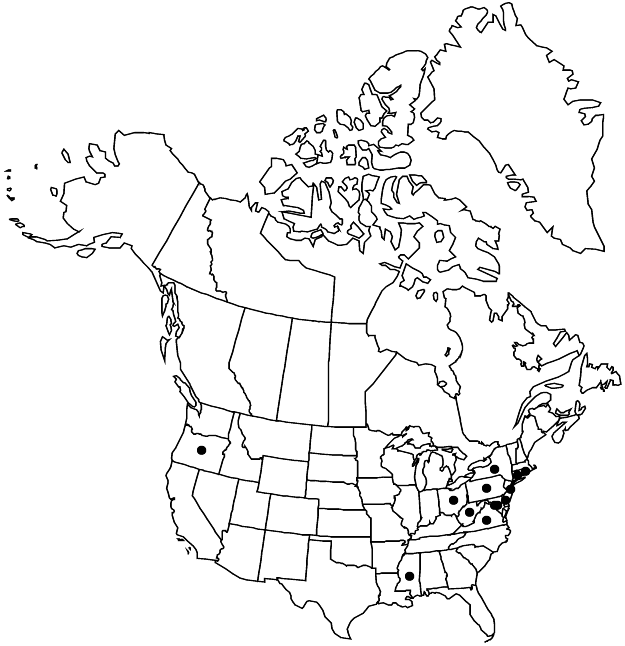Difference between revisions of "Persicaria perfoliata"
Beih. Bot. Centralbl. 37(2): 113. 1919.
FNA>Volume Importer |
imported>Volume Importer |
||
| (6 intermediate revisions by 2 users not shown) | |||
| Line 8: | Line 8: | ||
}} | }} | ||
|common_names=Devil’s-tail or giant climbing tearthumb;mile-a-minute weed | |common_names=Devil’s-tail or giant climbing tearthumb;mile-a-minute weed | ||
| − | |basionyms={{Treatment/ID/ | + | |special_status={{Treatment/ID/Special_status |
| + | |code=I | ||
| + | |label=Introduced | ||
| + | }} | ||
| + | |basionyms={{Treatment/ID/Basionym | ||
|name=Polygonum arifolium var. perfoliatum | |name=Polygonum arifolium var. perfoliatum | ||
|authority=Linnaeus | |authority=Linnaeus | ||
| + | |rank=variety | ||
| + | |publication_title=Syst. Nat. ed. | ||
| + | |publication_place=10, 2: 1006. 1759 | ||
}} | }} | ||
|synonyms={{Treatment/ID/Synonym | |synonyms={{Treatment/ID/Synonym | ||
|name=Polygonum perfoliatum | |name=Polygonum perfoliatum | ||
|authority=(Linnaeus) Linnaeus | |authority=(Linnaeus) Linnaeus | ||
| + | |rank=species | ||
}} | }} | ||
|hierarchy=Polygonaceae;Polygonaceae subfam. Polygonoideae;Persicaria;Persicaria sect. Echinocaulon;Persicaria perfoliata | |hierarchy=Polygonaceae;Polygonaceae subfam. Polygonoideae;Persicaria;Persicaria sect. Echinocaulon;Persicaria perfoliata | ||
| Line 30: | Line 38: | ||
|elevation=0-300 m | |elevation=0-300 m | ||
|distribution=Conn.;Del.;D.C.;Md.;Miss.;N.J.;N.Y.;Ohio;Oreg.;Pa.;R.I.;Va.;W.Va.;Asia. | |distribution=Conn.;Del.;D.C.;Md.;Miss.;N.J.;N.Y.;Ohio;Oreg.;Pa.;R.I.;Va.;W.Va.;Asia. | ||
| − | |discussion=<p>Persicaria perfoliata is an aggressive, fast-growing pest in its native range and in North America. At least some introductions appear to be through the nursery trade (J. C. Hickman and C. S. Hickman 1978; R. E. Riefener 1982). It was collected once in 1954 in British Columbia, but that population did not persist.</p> | + | |introduced=true |
| + | |discussion=<p><i>Persicaria perfoliata</i> is an aggressive, fast-growing pest in its native range and in North America. At least some introductions appear to be through the nursery trade (J. C. Hickman and C. S. Hickman 1978; R. E. Riefener 1982). It was collected once in 1954 in British Columbia, but that population did not persist.</p> | ||
|tables= | |tables= | ||
|references= | |references= | ||
| Line 39: | Line 48: | ||
-->{{#Taxon: | -->{{#Taxon: | ||
name=Persicaria perfoliata | name=Persicaria perfoliata | ||
| − | |||
|authority=(Linnaeus) H. Gross | |authority=(Linnaeus) H. Gross | ||
|rank=species | |rank=species | ||
| Line 54: | Line 62: | ||
|publication title=Beih. Bot. Centralbl. | |publication title=Beih. Bot. Centralbl. | ||
|publication year=1919 | |publication year=1919 | ||
| − | |special status= | + | |special status=Introduced |
| − | |source xml=https:// | + | |source xml=https://bitbucket.org/aafc-mbb/fna-data-curation/src/2e0870ddd59836b60bcf96646a41e87ea5a5943a/coarse_grained_fna_xml/V5/V5_1179.xml |
|subfamily=Polygonaceae subfam. Polygonoideae | |subfamily=Polygonaceae subfam. Polygonoideae | ||
|genus=Persicaria | |genus=Persicaria | ||
Latest revision as of 22:08, 5 November 2020
Plants annual, 10–20(–70) dm; roots not also arising from proximal nodes. Stems scandent, ribbed, glabrous, often glaucous; prickles 0.5–1 mm. Leaves: ocrea green, plane to broadly funnelform, 9–14 mm, at least some foliaceous, base inflated or not, without prickles, margins oblique, eciliate, surface glabrous, glaucous; petiole 4.5–8 cm; blade triangular, 4–7 × 4.5–9 cm, base truncate to cordate, usually peltate, margins entire, sparsely retrorsely prickly, apex acuminate, faces glabrous, usually glaucous abaxially. Inflorescences capitate or spikelike, uninterrupted, 5–12 × 5–10 mm; peduncle 10–50 mm, retrorsely prickly; ocreolae overlapping, margins eciliate. Pedicels mostly ascending, 1–3 mm. Flowers 1–3 per ocreate fascicle; perianth greenish white, glabrous, accrescent, becoming fleshy and blue in fruit; tepals 5, connate to ca. 1/3 their length, broadly elliptic, 2–3.5 mm, apex acute to obtuse; stamens (6–)8, filaments distinct, free; anthers pinkish, ovate; styles 3, connate proximally. Achenes included, black or reddish black, spheroidal, 3–3.5 × 3–3.5 mm, shiny, smooth.
Phenology: Flowering Jun–Oct.
Habitat: Thickets, streams banks, pastures, forest edges, roadsides, railroad embankments, other moist, disturbed sites
Elevation: 0-300 m
Distribution

Introduced; Conn., Del., D.C., Md., Miss., N.J., N.Y., Ohio, Oreg., Pa., R.I., Va., W.Va., Asia.
Discussion
Persicaria perfoliata is an aggressive, fast-growing pest in its native range and in North America. At least some introductions appear to be through the nursery trade (J. C. Hickman and C. S. Hickman 1978; R. E. Riefener 1982). It was collected once in 1954 in British Columbia, but that population did not persist.
Selected References
None.